
Nietzsche's Youth
 |
Nietzsche's Works of Youth - an selection New: The Young Nietzsche - a lecture |
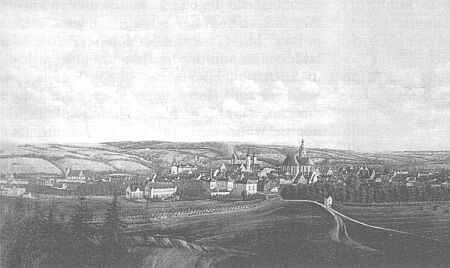
|
Im Jahre 1849 starb der Vater an einer schweren Gehirnerkrankung, als Friedrich fünf Jahre alt war; aus diesem Grunde mußte die Familie, bestehend aus der Großmutter Erdmuthe, den Tanten Auguste und Rosalie, der Mutter Franziska, der Schwester Elisabeth (ein jüngerer Bruder Friedrichs, Joseph, war 1850 gestorben) und der Dienstmagd, im Jahr 1850 das Pfarrhaus in Röcken verlassen und zog nach Naumburg. Die junge Witwe erhält nur eine kleine Rente, erbt aber nach dem Tod von Erdmuthe und Auguste ein kleines Vermögen. Nachdem die ganze Familie zunächst in der Neugasse gewohnt hatte, zog sie jetzt in eine eigene Wohnung hinter der Marienmauer. Im Oktober 1858 bezieht sie endlich das damalige Haus Nr. 355, das jetzige Nietzsche-Haus Weingarten 18 zur Miete, das unten abgebildet ist. In 1878, Franziska Nietzsche finally bought the house and lived in it until her death. In 1894, Nietzsche's sister Elisabeth established the Nietzsche Archives there for a short period. 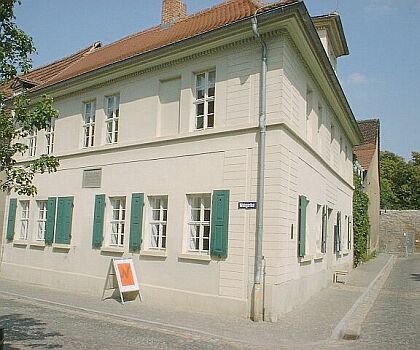 The house of Nietzsche's Mother, Weingarten 18 at Naumburg Nietzsche attended school in Naumburg until he received a scholarship for attendance of the nearby boarding school at Schulpforta where he graduated in 1864. The course of his life saw him return to Naumburg again and again when visiting his mother and sister. In 1889/90, when his illness had manifested itself, his mother took him into her Naumburg home to look after him there. 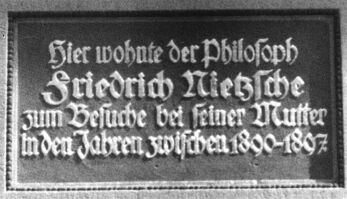 The Commemorative Plaque at the Nietzsche House From 1991 - 1993, the Nietzsche house was completely renovated by the City of Naumburg, whereby the old, historical core of the building was preserved as far as possible. In the spring of 1994, after the completion of the renovation, the permanent exhibition "Nietzsche in Naumburg" – that provides basic biographical information on Nietzsche – was set up there . After my August 2000 visit of Naumburg, I can only confirm the successful renovation--also the exhibit in the house is certainly worthy of a visit; you should certainly not miss to obtain the very informative catalogue of this exhibit! Below follows a photograph of the house that shows its present state: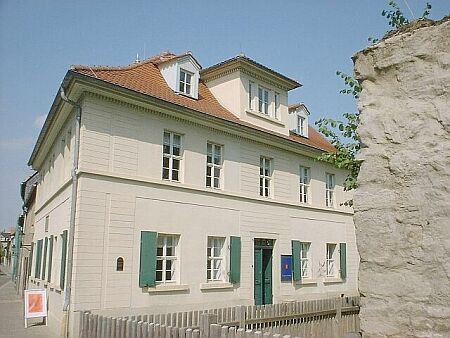 The house Weingarten 18 is situated directly at the city wall of which you can see a small part in the foreground. The Nietzsche-Museum Naumburg has a own very informative website, you get it here: www.museumnaumburg.de. From the Nietzsche house, one crosses the already very beautifully restored Marktplatz, passes by the Wenzelskirche and reaches the impressive Naumburg Cathedral, where Nietzsche went to school. The imposing building, but also his participation in church concerts, have left a deep impression on the pupil Nietzsche. 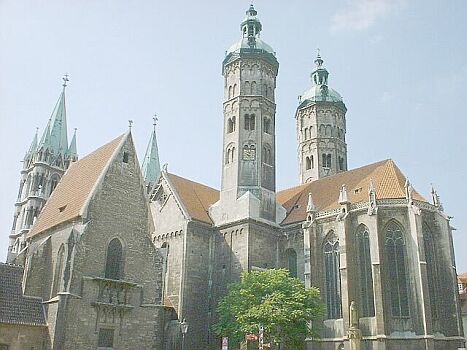 The Naumburg Cathedral with its two sets of steeples (HW 2000) What should not remain un-mentioned are the famous sculptures in the Naumburg Cathedral of its founders which, in their modernity, were well ahead of their time - a trait that they share with Nietzsche's philosophy?
Read up (in German) on Nietzsche's youth at
virtuSens
It might not be an unimportant aspect of Nietzsche's pre-disposition and personality that, already in his youth, he began to write reminiscences of his past, the first in 1858, thus at the age of 14 (!) years. Thus, the development of the youth Nietzsche can best be portrayed by himself, by our featuring some (by no means, all!) reminiscences of the various important stages without comment. Source of text: Friedrich Nietzsche - Werke in 2 Bänden, hg. v. Ivo Frenzel, C. Hanser Verlag AUTOBIOGRAPHICAL NOTES FROM THE YEARS 1856 - 1869 My Life (1858) My earliest childhood passed quietly and without any disturbance and enwrapped me gently, like a sweet dream. The peace and tranquility that surrounds the home of a Pastor left their firm roots in my mind, as one will generally find that the first impressions that the soul receives are never forgotten. All of a sudden, however, the sky darkened; my beloved father became seriously and permanently ill, and thus, our tranquil, golden peace, our calm family bliss, was replaced by fear and tension. Finally, after a long period, the terrible event happened: my father died! Even now, the thought of it deeply and painfully touches my innermost; at that time, I did not realize the importance of this event as I do now. – When a tree is robbed of its crown, then it looks barren and sad. Listlessly, its branches are drooping down to the ground; the birds leave the barren branches and all life vanishes. And was this not also the case in our family? All joy had vanished; pain and grief took its place. – After half a year, we left the peaceful village, and I was without a father, without a home. Naumburg offered us a place to live; God also sent a great deal of love our way there; however, all my yearnings go back to the home of my dear father, and on wings of longing and nostalgia, I often fly to the place where my first happiness once blossomed. In Naumburg, a new part of my life began. Here, I met and won my dear friends P. and K. who made Naumburg dear to me forever, even though, at this place, our family also experienced many a misfortune; yet, God's blessing hand could still be recognized. After I had attended some preparatory courses in an institute, I was admitted to the Domgymasium (high school). Here, faithful teachers were ceaselessly striving to increase and foster our knowledge. However, also the relationship between the students and their caring for each other made this institution very valuable and precious. I felt quite well here and would certainly have stayed here until I would go to university, had it not been God's wisdom to decide otherwise, since, suddenly, there was offered to us a scholarship for me at Pforta. Well, the heavenly father shall also guide and lead me here. 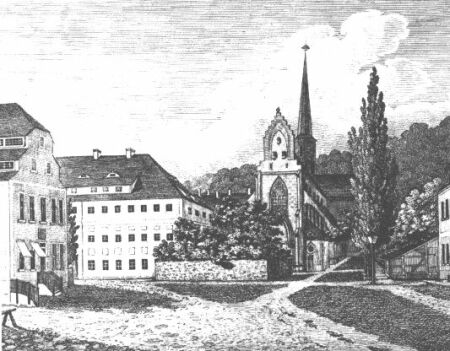
Pforta in the middle of the 19th century After Nietzsche, in the in-between years, had written further reports on his life, he rendered a further report after his completion of his school attendance at the "Pforte" (Pforta): My Life (1864) The purposes for writing a life description are manifold and, due to this, also require different means of execution. In the case on hand my aim ust be to render and leave behind for my educational institution – whose influence on me I owe the predominant and most characteristic elements of my education – a description of the course of my education that I received at it, that is written at that time at which I am about to – by leaving behind an old sense of order that I am accustomed to – embark on growing into further and higher educational realms in order to set new trails for the development of my mind and, with it, to begin a new development. Of the turning-points that, thus far, have divided my life into different parts, I shall, particularly, mention two: the death of my father, the country pastor at Röcken near Lützen, and the move of our family to Naumburg that was caused by it, thus an event that concluded the first five years of my life, followed by my changing from the Naumburg Gymnasium to that of Pforta which falls into my fourteenth year. About the earliest period of my childhood I know little; what I have been told of it, I do not like to repeat. I certainly had excellent parents, and I am convinced that particularly the death of such an excellent father, on the one hand, deprived me of paternal help for my later development while it, on the other hand, planted the seeds of the serious, retrospective in my soul Perhaps it was a disadvantage that, from then on, my entire development was not supervised by a male family member, but rather that my inquisitiveness and eagerness to learn, led me acquiring knowledge in a wide variety of fields of knowledge in the greatest possible disorder, all of which was very likely suited to confuse a young mind that had barely left its nest as a fledgling, and to jeopardize its building a base for solid knowledge. Thus, thus period from my ninth to my fifteenth year, is characterized by a true craving for "universal knowledge", as I used to call it, while, on the other hand, child-adequate playing was not neglected, but rather, pursued with zealous dedication so that I have written small booklets about just any kind of game that I played and presented them to my friends. Awakened to it by a particular coincidence, in my ninth year, I began to pursue music, and that immediately in composition, if one can call the attempts of an excited child of putting down on paper sequences of notes and tones and of singing biblical texts by accompanying them on the piano with his own fantastic improvisations. Likewise, I wrote horrible poems, and that with the greatest eagerness, nay, I even drew and painted. 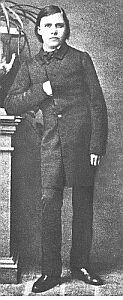
As seventeen-year-old student at Pforta (1861) When I came to Pforta, I had already taken a look at most of the sciences and arts and felt that I had an interest for all of them, save for the all-too-rational and boring mathematics. However, in due course, I developed an aversion against this all-too-aimless wandering between all areas of knowledge; I wanted to force my self to limit myself in order to focus on and gain a deeper understanding of particular subjects. I was able to pursue this goal comfortably by founding a small scientific club for the fostering of our education, with two like-minded friends. Our monthly submission of essays and composition and their criticism, as well as our quarterly meetings, on the one hand, forced our minds to focus on more particular, yet stimulating subjects, while, on the other hand, they worked against the flattening influence of "fantasizing" by our thorough study of compositional theory. At the same time, my inclination towards classical studies grew steadily; with the greatest pleasure, I remember my first impressions of Sophocles, Aeschylos, and Plato, particularly in my favorite work of his, the Symposion, and then of the ancient Greek lyricists.
I am still involved in striving for a growing deepening of my knowledge and it is natural that, most of the time, I think as little of my own achievements as of those of others, since, in almost every subject to be dealt with, I find something that cannot be clarified or, at least, not easily be clarified. Therefore, here shall only be made mention of one of my projects that I worked on during my school years: my essay on the Ermanarich saga. 
As a young university student (1864) Now that I am about to enter university, I shall hold on to this as an unshakeable principle for my further scientific pursuits: to fight against the inclination towards a flattening pursuit of too much of knowledge, and then to further my inclination to try to lead each detail back to its deepest and farthest-reaching origin. If these inclinations appear to cancel each other out, then this is certainly not incorrect in particular instances, and I can observe something similar in myself. In fighting against the one inclination and in the furthering of the other one I hope to be victorious. Read up (in German) on Nietzsche's university studies
in Bonn at
virtuSens And also the philology student Nietzsche who is just about to complete his studies, holds this mirror in front of himself in the year 1869: I, the son of a Protestant country pastor, was born on October 15, 1844, in the village of Röcken near Merseburg and lived there for the first four years of my life. However, when the untimely death of my father created the necessity of looking for a new home, it was Naumburg which my mother chose. Here, I was prepared for the local Domgymnasium in a private institution, without, however, remaining at this Gymnasium indefinitely. This was due to the opportunity that arose of finding a place of study at nearby Schulpforta. The pre-requisites for the study of philology are virtually handed to a student of that facility. In this institution, specific philological tasks are put to him, i.e. critical comments on certain choral texts of Sophokles or Aeschylos. Another particular advantage of Schulpforta is that the reading of ancient Greek and Roman writers is en vogue amongst the students, themselves. However, the most fortunate circumstance was that I met excellent philological teachers there, men such as Steinhart, Corssen, Koberstein, Keil, Peter, who, in part, also showed some interest in me. When I, after six years of study at Schulpforta left this strict yet useful school as my task master, I bade farewell to it with gratitude and went to Bonn. Here, for some time, my studies concentrated on the philological aspects of new testament criticism and on new-testamentary source studies. In addition to these theological excursions, I attended philological and archaeological seminars. From afar, I revered the personality of Ritschl. Therefore, I found it quite natural to leave Bonn at the same time as he did and to choose Leipzig as my new academic home. 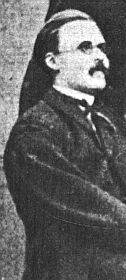
In the "Philologische Verein in Leipzig" (1866) Here, I felt very comfortable; above all, I found a number of like-minded fellow students with whom I soon founded a philological club. In this club, I have held five major lectures, the titles of which should be mentioned here. »Die letzte Redaktion der Theognidea«, »Die Quellen des Suidas«, »Die aristotelischen Schriftenverzeichnisse«, »Die Gleichzeitigkeit Homers und Hesiods«, »Der Zyniker Menipp und die Varronischen Satiren«. Due to Ritschl's engagement, the following essays were printed in the Rheinische Museum: »Zur Geschichte der Theognideischen Spruchsammlung«, »Das Danaelied des Simonides«, »de Laertii Diogenis fontibus«. In 1866, I ventured into trying to solve a prize question posed by the philosophical faculty. The news that I had done so successfully, I received at Naumburg, since I, in the meantime, had to interrupt my studies in the summer of 1867, since I had been found fit for military service. As an artillerist, I was busy in acquiring the skills for this line of military discipline; however, due to an unfortunate fall I developed a serious illness that brought with it as a consequence the fortunate circumstance that I could return to my studies sooner than military rules would have allowed for. In October, 1868, I left Naumburg completely recuperated in order to prepare myself for my graduation and habilitation in Leipzig, since it was my intent to accomplish both at the same time; however, pursuant to existing academic legislation, I was not able to habilitate myself before Easter, 1869.– Friedrich Wilhelm Nietzsche 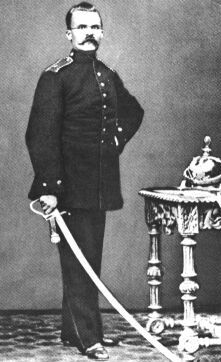
As field artillerist (1868) To the top of the page |